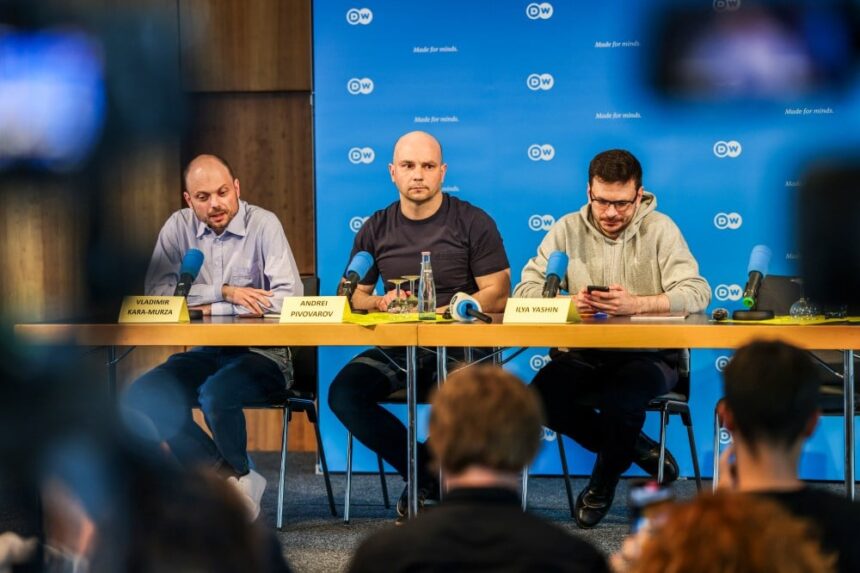Summary by Geopolist | Istanbul Center for Geopolitics:
The article from Foreign Policy discusses the recent Russian political prisoner swap involving prominent figures like Vladimir Kara-Murza and Ilya Yashin. Here’s a detailed summary:
-
Background: The swap occurred amid ongoing tensions between Russia and the West. Kara-Murza and Yashin are notable Russian political activists who had been imprisoned by the Russian government. Their cases have drawn international attention, highlighting issues of political repression in Russia.
-
The Swap: It reveals that the swap was facilitated by Germany, which played a key role in negotiating the release of the prisoners. This move is seen as part of Germany’s broader diplomatic efforts to address human rights concerns in Russia while managing its own geopolitical interests.
-
Political Context: It explores the political implications of the swap, including its impact on Russian President Vladimir Putin’s image and the potential reactions from various political factions within Russia and abroad. The swap is also viewed in the context of the broader relationship between Russia and Western countries, particularly in light of recent conflicts and diplomatic strains.
-
Reactions and Implications: The swap has been met with mixed reactions. Some view it as a positive step towards improving human rights conditions in Russia, while others are skeptical about the effectiveness of such diplomatic measures. The article also touches on the potential for the swap to influence future negotiations and diplomatic engagements between Russia and Western nations.
Overall, it provides a comprehensive look at the political dynamics surrounding the prisoner swap and its broader significance in the current geopolitical landscape.
Read more below.
The Russians Putin Traded Away
In the days before he was released as part of a major east-west prisoner exchange last week, Russian opposition politician Ilya Yashin was held in isolation in Moscow’s Lefortovo prison. Though he’d been stripped of all his belongings save for a toothbrush and toothpaste, his prison guards relented to his pleas of boredom and brought him something to read. The material they selected? The memoirs of Andrei Sakharov, a Soviet dissident who defended the rights of political prisoners during the Cold War.
His jailers appeared to have a sense of humor, Yashin told the independent Russian news outlet Mediazona in an interview over the weekend.
As part of the multicountry prisoner exchange, the United States and Germany secured the release of several of their citizens, as well as Yashin and six other Russian political prisoners. Yashin and his compatriots are now free but have effectively been forced into exile, having been traded away by their own government in exchange for criminals, spies, and a high-level assassin.
Among the other Russian dissidents included in the swap were Oleg Orlov, a longtime activist and founder of the Nobel Peace Prize-winning human rights organization Memorial; Ksenia Fadeyeva; Lilia Chanysheva; and Vadim Ostanin, who led a local office of late Russian opposition leader Alexei Navalny’s anti-corruption foundation; Andrei Pivovarov, the former head of the now-shuttered rights group Open Russia; and Alexandra Skochilenko, a St. Petersburg artist who replaced supermarket price tags with information about the war in Ukraine.
“Only Putin trades Russians for Russians,” said Angela Stent, a longtime scholar of U.S.-Russia relations, referring to the country’s president, Vladimir Putin.
While there was a small handful of similar expulsions and swaps of prominent Soviet dissidents during the Cold War, including Vladimir Bukovsky and Natan Sharansky, the inclusion of several dissidents and opposition politicians who appear to have only Russian citizenship is another notable dimension of the historic deal and speaks to the high-stakes diplomatic wrangling—spanning well over a year—that culminated in last week’s trade.
Central to unlocking the deal was persuading Germany to release Vadim Krasikov, a Russian assassin serving a life sentence in Germany for killing a Chechen militant in a Berlin park.
Key to convincing Germany to release Krasikov was to include him in an exchange for Navalny. “For Germany, it was important to have a moral justification for release of the murderer,” said Natalia Arno, president of the Free Russia Foundation, who has lobbied extensively for the release of Russian political prisoners.
By mid-February, Putin had accepted the deal, which was pending formalization through intelligence back channels, said Christo Grozev, an investigative journalist who was closely involved in efforts to secure Navalny’s release, in a text to Foreign Policy. A senior Biden administration official, who spoke on condition of anonymity to discuss the negotiations, disputed this account and denied that Grozev had been involved in efforts to secure an exchange. “We have no indication that Putin was prepared at some point to release Navalny,” they said.
Either way, Navalny’s sudden and still unexplained death on Feb. 16 dramatically altered the calculus once again. The senior administration official said that Russian political prisoners were part of their thinking as they were trying to formulate the deal prior to Navalny’s death but that efforts to include them as part of a trade accelerated in the wake of the opposition leader’s death in an Arctic penal colony.
“We basically, that same day at the White House, get the directive to start formulating lists of what could make the deal still politically viable for Germany without Navalny,” said a second senior U.S. official. If they couldn’t trade Russia’s most prominent political prisoner for Krasikov, maybe they could secure the release of several others instead.
The final roll of Russian names drew in part from lists of political prisoners from recognized human rights organizations in Russia and the West as well as the State Department’s own records, said a third senior administration official.
“It’s truly agonizing,” said the official, speaking of the decision-making process. “It’s just impossible to get all of the good people out.”
The first official noted that the entire exchange was done in very close coordination with Berlin.
At least two of the Russians released last Thursday, including Vladimir Kara-Murza (who also holds U.K. citizenship) and Fadeyeva, have said they were not asked to consent to the swap. Yashin, who was sentenced to over eight years’ imprisonment for criticizing Russia’s war in Ukraine, said he actively opposed being included in the exchange. Yashin said he wrote a statement to the head of the pretrial detention center saying they’d have to use force to expel him from the country and that he considered tearing up his passport to prevent his expulsion.
Yashin became visibly emotional at a press conference in Bonn, Germany, on Friday, speaking about his release. “When I found myself in Germany, my first wish was to go to the airport immediately, buy a ticket, and return to Russia,” he said.
He spoke of the responsibility of knowing that if he did so, it would undermine any future efforts to secure the release of other Russian political prisoners. “It’s unbearable,” he said. Yashin has spoken about his disappointment that Alexei Gorinov, a Russian democracy activist imprisoned for criticizing the war in Ukraine, was not among those released. Gorinov suffers from a chronic lung condition and is reported to be in extremely poor health.
The first senior administration official declined to comment as to whether they had sought Gorinov’s release.
Those released on Thursday represent a fraction of Russia’s political prisoners. Almost 800 people are currently imprisoned on charges regarded to be politically motivated or on religious grounds, according to the Russian human rights group Memorial, although the real figure is likely much higher. After touching down at Joint Base Andrews on Thursday evening, Wall Street Journal reporter Evan Gershkovich said he was glad to see Russian political prisoners included in the trade. “I spent a month in prison in Yekaterinburg where everyone I sat with was a political prisoner. Nobody knows them publicly,” he said.
When the Russian and German former prisoners landed in Cologne Bonn Airport in Germany on Thursday evening, they were met by German Chancellor Olaf Scholz before being transferred to a nearby military hospital in Koblenz for medical checks. Many were still wearing the drab black uniforms of the Russian prison system.
Addressing criticism in Germany over the decision to release Krasikov in exchange for their freedom, Kara-Murza said at a press conference the next day that he had reminded Scholz of a passage from the Talmud, a key Jewish text, that whoever saves one life saves the entire world. “Yesterday, 16 human lives were saved. I don’t think anything in this world could be more important,” he told the gathered reporters.
After the press conference and a whirlwind of interviews and ecstatic reunions, Kara-Murza and Yashin returned to Koblenz with Arno of the Free Russia Foundation late in the evening. They searched for somewhere to eat what would be their first proper meal with friends since their release, but they found that most restaurants in the small German town had already closed for the night. “We just found a place that served some antipasti, cheese, and prosciutto and olives,” Arno said.
By Amy Mackinnon
Source: Foreign Policy







